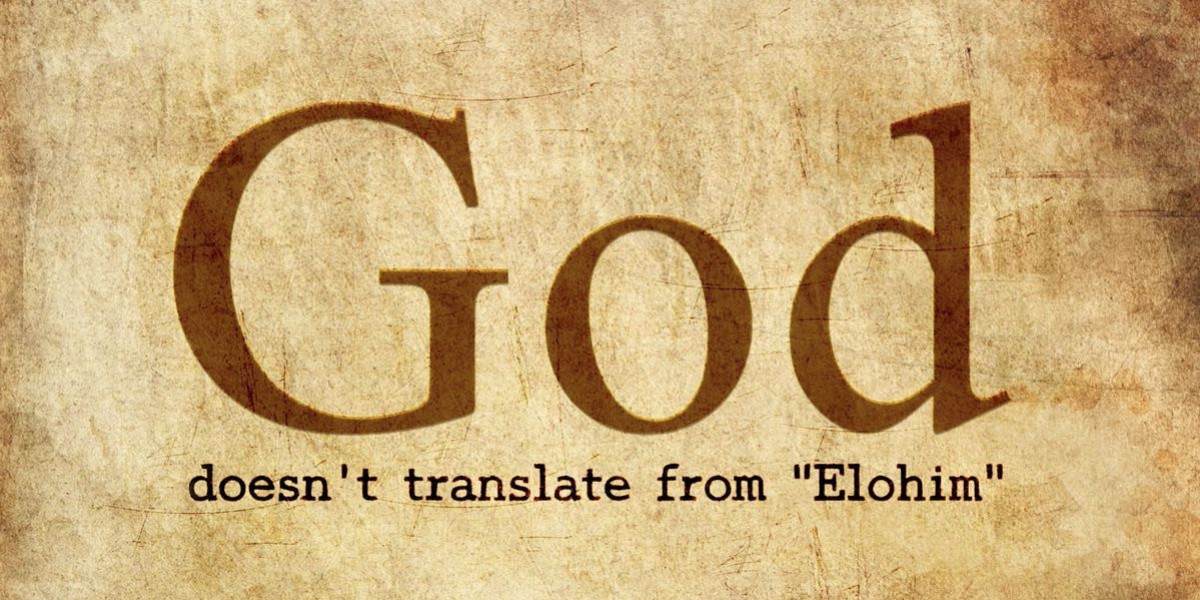It is everyone’s instinctive response to say, “God means God.” It’s a universal reply from everyone who hears that the word “God” is an adoptive term from a foreign religion reimagined to apply to our Heavenly Father.
All have the same exact reaction, and it is to reply with “God means God” - a meaningless phrase….of course it does…but what does the word “God” mean?
If we say “God means God” we are using the word to define itself, and therefore not saying anything at all.
The word “God” was not a translation of what the Bible says which is “Elohim”. Elohim translates to Mighty One, Majesty, Force, Power, Authority…a number of notions really, but not God.
God is Saxon transliteration of the German Gott which comes from either the word Goth from the Gothic people or one of two ProtoIndo European words meaning “invocation” or “pouring out”.
The English language has being developed by British and French Christians over hundreds of years. And many of the old English terms such as “God” which refered to a whole host of irrelevant things was one such term.
God was used to refer to elves, fairies, gnomes, dragons, giants, various nature spirits, and the various beings that the Angles, Saxons, Jutes, and Frisians worshipped. It could pretty much refer to anything but the Almighty Maker of Heaven and Earth as that pagan culture had no such concept.
One of the tricks translators do is to adopt local ideas and insert them into their work so the foreign facts they are trying to explain sound familiar. The problem is that the local concepts don’t represent or usually even relate to the same things the scribes are associating them with.
And the scribes take the local concepts also adopt the native terminology superimposed upon the foreign thing remaking the religion in particular into the image of the familiar.
As a result, all the English versions of the Bible that remove YHWH and substitute “the LORD” instead and render Elohim as “God” instead of an actual translation, such as “Mighty One” or “Majesty” are rendered corrupted.
To some this may seem an issue of anglophobia, that is to say and irrational fear of english things. Yet we are using the english language to convey the message at present, so such a feeling should be far from the understanding of anyone reading.
That bad habit of the translators, what they call “nativization“ is not an issue exclusive to English language and culture either. It is an equal opportunity offender, a killer of correctness employed in other languages also. The translators adopt local terminology, assume its semantics and say that it’s translation. And so they say for all the idols of the nations they encounter anywhere. In every culture they encounter, the translators accept the names of their idols or a term that applied to them in general such as: Bog, Nana, Isten, Jumala, Dumnezeu, etc., repurposing those words to refer to the Biblical Elohim.
And the people assume it’s a translation because the authorities on translation assume it’s a translation.
Translation is supposed to use the local language as a vehicle for carrying over the meaning of the foreign language. But nativization is not treating the local language as a carrier for the foreign message. It is instead, exchanging the local language for that of the original, and the foreign message for a local one.
Rendering Greek to Latin is easy, because the languages are related and their thought patterns familial. Or Hebrew and Aramaic or Arabic. But all too often, the more unfamiliar the language and culture linked to the people and language being translated, the more the translators adopt local terminology and use these words as replacements under “assumed equivalency” rather than actually doing their job of translating.
In the case of Elohim, it’s a complex concept that doesn’t have an equivalent in old AngloSaxon culture which thought the universe was crafted from the dead body of a giant and not fashioned from nothingness by an all powerful, ever present, and all knowing Entity of infinite complexity and yet singularity.
So the translators simply adopted the term that Saxons used exclusively for things they thought of as supernatural and superimposed this on the Biblical Being we worship.
In after years they still call it a translation, the continued belief relying on the fact that no one checks or considers that checking is even necessary. And when the subject is raised it is universally chocked up to semantics…everyone is certain but nobody checks.
Are you ready to stop accepting by assuming?
Are you ready to start checking?
Second Guess First Assumptions
Question Everything
Get Biblical






